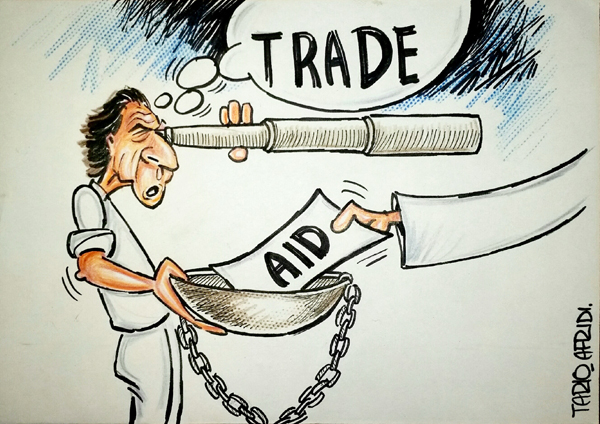 There’s no such thing as a free lunch. And nowhere is this aphorism more apparent than in international relations. In their speeches states-person extol one another and put bilateral ties on a high pedestal with an assortment of diplomatic performances. However, once you scratch the surface, you get to the realpolitik, with economic interests lurking around what are presented to the public as ‘brotherly ties’ and ‘fraternal bonds’. Such is also the case with Pakistan’s ties with Gulf monarchies, and we must not lose sight of the underlying realpolitik in the latest round of visits to finalise the financial package, a euphemism for the latest display of largess by Saudi Arabian and Emirati monarchs.
There’s no such thing as a free lunch. And nowhere is this aphorism more apparent than in international relations. In their speeches states-person extol one another and put bilateral ties on a high pedestal with an assortment of diplomatic performances. However, once you scratch the surface, you get to the realpolitik, with economic interests lurking around what are presented to the public as ‘brotherly ties’ and ‘fraternal bonds’. Such is also the case with Pakistan’s ties with Gulf monarchies, and we must not lose sight of the underlying realpolitik in the latest round of visits to finalise the financial package, a euphemism for the latest display of largess by Saudi Arabian and Emirati monarchs.
Earlier in October last year, Pakistan received a $6bn package from Saudi Arabia. And now, deals have been made with the crown prince of Abu Dhabi in his day-long visit on Sunday.
With this visit, Pakistani and UAE leadership have met thrice now in three months. Last week, the two countries finalised the terms and conditions of a $6.2 billion support package to help Islamabad address its perennial balance of payments crisis.
For starters, none of the dollars offered to Pakistan in this package come free of charge. The money will have to be returned, with an interest on top of the principle amount, as is the norm in the international market. Secondly, the purpose of this package is to enable the country to pay for its import bill, mostly to entities in China with whom it has started doing business in the wake of the China-Pakistan Economic Corridor projects. Thirdly, like all such packages, this one will also have some strings attached.
The problem with strings attached to financial packages offered by authoritarian monarchs answerable to no one in their home countries is that they may or may not be in the interest of the nascent Pakistani democracy. We remember very well how things turned out the last time: the former army chief got a lucrative job to head a controversial military alliance headed by Saudi Arabia without the matter having been debated in the Parliament. We can’t afford such adventures for they entrap Pakistan into the sectarian conflict between Gulf monarchies and Iran.
Therefore, the government will be best advised to fix structural issues in the economy so that the country does not need financial packages every now and then. The bottom line: i) Pakistan needs to make its economy grow at a rate on which enough employment opportunities can be generated to manage the youth budge, and, ii) Pakistan needs to be able to pay for this growth without reliance on the international financial institutions or authoritarian monarchies with generous cash-flows. Only by meeting these two conditions can the government align its foreign policy with national interests like strengthening of constitutional democracy, promotion of religious and ethnic pluralism and nurturing of an egalitarian social order. Easier said than done, of course, since the authorities in Islamabad and Rawalpindi will have to rework the national project altogether. A Pakistan that has strengthened democratic institutions overseeing a pluralist and egalitarian social order will have no business dealing on friendly terms with theocracies and monarchies that live by the law of the jungle and fail to meet all international norms of democratic civility. Such a Pakistan will be able to name and shame the Saudi crown prince for his hands are red with journalist Jamal Khashoggi’s murder. Such a Pakistan will also raise its voice against Saudi brutalities in Yemen in the same breath as it condemns Indian and Myanmar violence in Kashmir and Rohingya areas.

No comments:
Post a Comment